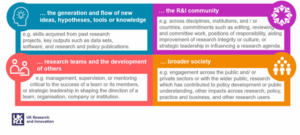I ran a briefing session last week on the topic of Narrative CVs. In that session we covered:
- The rationale for using Narrative CV’s
- The 4 key modules and what experience could be covered in each of these
- Further sources of support around Narrative CVs and writing one
We focussed mostly on the UKRI’s Resume for Research & Innovation template. As a reminder the four key modules are:

A top tip when writing one of these documents, for the first time, is to remember that it is a time consuming process and one that can involve plenty of thought and consideration regarding, which examples to place where. However, once you have created a Narrative CV it will be easier to write another and thinking about your skills and achievements can feed into other documents such as annual appraisals and PDR’s. Remember that the Narrative CV is very much about quality over quantity! In order to make the best use of space stick to highlighting 2-3 examples per section. Be strategic about which section you include certain examples in. Keep asking yourself “why” am I highlighting this and “what” did I gain from this experience? Remember too that if talking about metrics you must set this within context and explain why you are choosing to highlight this.
When writing bout your experience it can be useful to think of each of the modules as questions on an application form. Aim to describe the “Context” of each example, followed by the “Action” that you undertook and finally highlight what the overall “Result” was.
At the end of the session a few participants asked for more information on Team Narrative CVs. There is not much information widely available regarding Team Narrative CVs, which is possibly due to a lack of information and evaluation, as yet available from those assessing Narrative CVs. Consider as a team the message that you want the CV to convey. It can be difficult to fit several people’s experience into a word limited document so aim to select the strongest examples that will help the project be successful (don’t forget to say why). You could ask the team as a whole to review the examples used or it might be easier to designate one team member the responsibility of editing the examples used. Be mindful of achieving a good balance of experiences throughout the CV. Be mindful that Early Career Reasearcher’s experiences should be included and not squeezed out by more experienced colleagues.
Further Resources:
Oxford University provide a very structured guide to writing a Narrative CV
The University of Glasgow has an online course to help you write each section
The University of Cambridge Careers Service has created a very helpful video to support the creation of a Narrative CV (designed for Early Career Researchers)
IAD Narrative CV webpage links to further examples from within The University of Edinburgh and an annotated example from the University of Surrey
Guidance from UKRI on the R4RI (Resume 4 Research & Innovation)
If you’d like further help regarding drafting and reviewing a Narrative CV book a 1:1 Career Consultation for further discussion.


